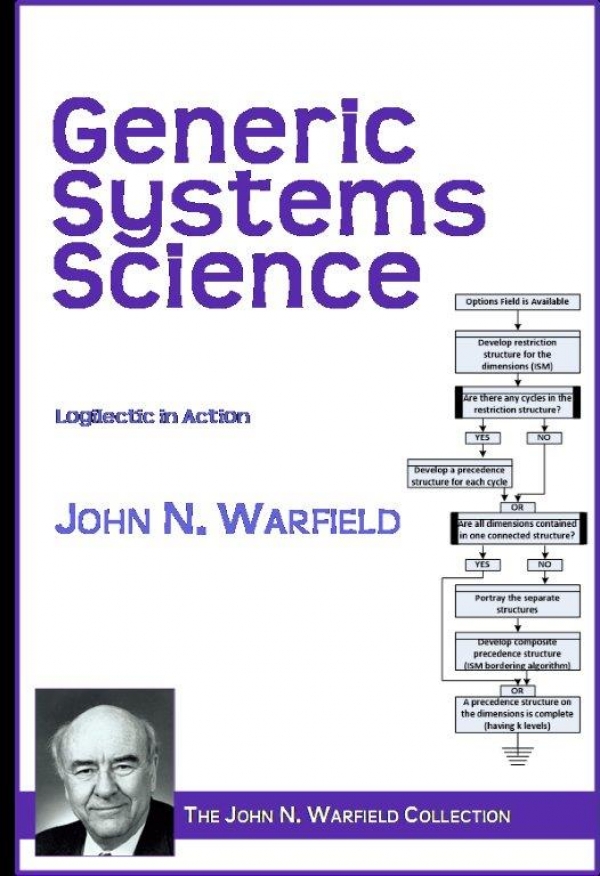GMU HAS Warfield’s PRE-PUBLICATION DRAFT, an unbound printout of Warfield's last WordPerfect file (ENTIRE BOOK.wpd) dated April 27, 2009. The printout was sent to the library's Special Collections department in April 2013 as part of a larger shipment of two bankers boxes filled with papers. This unbound manuscript is not complete. Chapter references have not been checked for accuracy or completion; the end of book bibliography section is missing and there is no index. Finally, there are four PowerPoint figure pages which must be printed separately and inserted manually into the printout.
The 2009 draft manuscript is still uncatalogued by Special Collections department, but is in storage somewhere in Fenwick Library. (R.W. 23 April 2015)
In early November 2009 Warfield asked Roxana Cardenas to edit and finish the manuscript and to become its principal author with Warfield as co-author. Dan Warfield was to take on job of publishing the book. However, there have been several delays with neither Roxana nor Dan having time from their regular jobs to devote to book matters. By March 2012 Rose had completed the References section.
Roxana has a copy of the original manuscript. Joe & Mary Simpson were sent a copy in 2012 with permission to use parts of the manuscript for teaching. Roxana and Carmen Moreno also have permission to use the manuscript in classes at ITESM in Mexico.
Warfield wrote the manuscript in Spring 2009. Discovering that his previous book, An Introduction to Systems Science was not selling very well, he decided to produce this book, which he declared is not anything fancy, just a textbook. He said that he was able to complete the entire book quickly because he adapted and reused material from his earlier writings. He completed the final manuscript in April, but had no publisher and until then the indexing would be fruitless because every publishing system has differing page formats.
Readers of the manuscript will quickly discover that it is a recap of previous writing but also a refinement. It is a short book, confined to what in his later years he considered essentials.
"Systems Science as I understand it and as I want future students to understand it" is how John Warfield has described it to Rose.
It is a summary of his life's studies, whittling out the topics and ideas he felt no longer essential and restating ideas he felt to be basic for future establishment of Systems Science as a verifiable academic discipline. By this phase in his writings Warfield has begun to support only two methodologies- NGT (Nominal Group Technique) and ISM (Interpretive Structural Modeling), relegating all others to unnecessary or subsidiary to these two.
He came to believe that the resolution of complex problems needs only these two methodologies, not a vast menu of methods. In this his last book, Warfield tries to support these methods by showing how their results can be organized and put into use. Warfield adapted NGT from studies of Delbecq. He developed ISM based on Harary's graph theory. Warfield claims credit for invention of ISM, with full and frequent acknowledgement to Harary for the graph theory underlying it.
His provisional Table of Contents first lists a series of prefaces and introductory materials then continues with a list of chapter titles, which together take up two pages at the beginning of the book: The complete book including front matter (but without index or references) is 191 typed manuscript pages.
Work has resumed on the manuscript in 2019, led by Dan Warfield, and we hope to have a published book by the end of 2019. The structure will certainly change, however the provisional table of contents provides a guide to what to expect.
PROVISIONAL TABLE OF CONTENTS
Preface for the Elder
Paradigm Villages and Killer Assumptions, Origins in the Disciplines, Behavioral Pathologies, The Restriction to Structuring Confusion,
The Names of the Action Component, Logilectic, Practitioners and Scholars, Special Collection
Preface for the Student
Socratic Learning, Generic, Logilectic, Syllogism and Categorization, Graphacy, Links
Preface for the Leader
Outline of Generic Systems Science
Concepts for Insight Generation, Insight Inhibitors and Antidotes, Form Follows Function,The Problematique: Definition and Insight,
The Linguistic Triad, Field and Dimensionality, Handoff Groups, Examples: Modified Practices, Example: Large System Design,
Behavioral Pathologies, Killer Assumptions
Elaboration of the Contents
A Law and a Theorem, Theory of Relations, Counting and Dimensionality, Inhibiting Insight Acquisition, Constraints on Process Selection, The Logilectic, Metrics of Complexity, The Problematique: Gaining Insight, The Linguistic Triad: The Graphics Advantage, Field Structure: Dimensions, Options Field, Comparative Design Sub-Groups: Work Program Construction, Handoff Groups: Observatorium, Examples of Two Modified Interactive Management Workshops, Example of a Large Strategic System Design, Behavioral Pathologies, Removing the Impact, Killer Assumptions, Academia, Killer Frameworks
Chapters (provisional)
CHAPTER 1. Concepts for Insight Generation
CHAPTER 2. Insight Inhibitors and Antidotes
CHAPTER 3. Form Should Follow Function
CHAPTER 4. The Logilectic: Definition and Insight
CHAPTER 5. The Linguistic Triad
CHAPTER 6. The Logilectic Fields and Dimensionality
CHAPTER 7. The Handoff Groups
CHAPTER 8. Examples of Modified Workshops
CHAPTER 9. Example Strategic Design: Ford Motor Company
APPENDIX 1. Behavioral Pathologies: Individual, Group, and Organization
APPENDIX 2: Demands of Complexity Meet the Killer Assumptions


